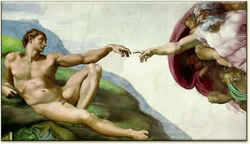
The creation of Adam, by Michelangelo
Affirming that "God created the heavens and the earth" (Gen 1:1), the Catechism highlights the importance of this teaching:
- The question about the origins of the world and of man has been the object of many scientific studies which have splendidly enriched our knowledge of the age and dimensions of the cosmos, the development of life-forms and the appearance of man. These discoveries invite us to even greater admiration for the greatness of the Creator, prompting us to give him thanks for all his works and for the understanding and wisdom he gives to scholars and researchers. With Solomon they can say: "It is he who gave me unerring knowledge of what exists, to know the structure of the world and the activity of the elements. . . for wisdom, the fashioner of all things, taught me."
- The great interest accorded to these studies is strongly stimulated by a question of another order, which goes beyond the proper domain of the natural sciences. It is not only a question of knowing when and how the universe arose physically, or when man appeared, but rather of discovering the meaning of such an origin: is the universe governed by chance, blind fate, anonymous necessity, or by a transcendent, intelligent and good Being called "God"? And if the world does come from God's wisdom and goodness, why is there evil? Where does it come from? Who is responsible for it? Is there any liberation from it?
Beyond that, the Church has (appropriately) mostly refrained from doctrinal pronouncements on exactly how creation occured. Keelin McDonell explains helpfully in an article for Slate, What Catholics Think of Evolution: They don't not believe in it.
- What is the Catholic Church's stance on evolution? That it's a fine theory for explaining the natural world as long as it doesn't deny divine purpose and causality.